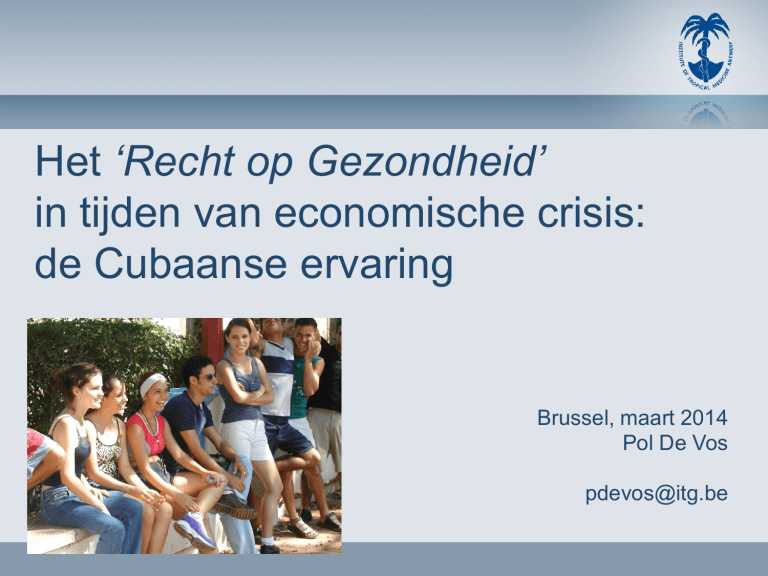
Het ‘Recht op Gezondheid’
in tijden van economische crisis:
de Cubaanse ervaring
Brussel, maart 2014
Pol De Vos
[email protected]
1986 - 1991
•1991 / 1993
•1996 - 2012
•
Structurele samenwerking ITG – INHEM & IPK (DGOS)
–Van binnenuit/onderuit Cubaanse gezondheidspolitiek doorgronden
–
•Sterke
en minder sterke punten in de gezondheidszorg
•Concrete gevolgen van de complexe internationale context
•Gevoerd beleid
•Rol van Cuba in Latijns-Amerika (en ver daarbuiten)
2010
•
Recht op gezondheid
•
SSS & WHO
–“Health for All”
–“Investing in health”
–WHO 2008
–
Colombia versus Cuba
•
Cubaanse visie op gezondheid
•
SDH
–Pre 89
–Post 89
–Internationale solidariteit
–
Cuba vandaag
•
Recht op gezondheid
•
SSS & WHO
–“Health for All”
–“Investing in health”
–WHO 2008
–
Colombia versus Cuba
•Cubaanse visie op gezondheid
•
SDH
–Pre 89
–Post 89
–Internationale solidariteit
–
Cuba vandaag
•
Recht op gezondheid – WHO 1948
1948 – WHO Constitution
•
"the enjoyment of the highest attainable standard of health
is one of the fundamental rights of every human being...“
Health sector financing
TAXATIONS
Government
UK, Nw, Sw, Cuba
CONTRIBUTION
social security
B, D, Fr
PREMIUM
private insurers
“’Managed care” (US)
CHARGES
individuals
HEALTH CARE
health care providers
WHO Conference in Alma Ata - 1978
Integrated health and health services strategy
•
Government responsibility
–Universally accessible health services
–Multi-sectorial approach
–Participation
–
Comprehensive approach towards
•health
•
New International Economic Order
–
Foto Reagan & Thatcher
Neoliberale maatregelen van beide
Antivakbond
Sandinisten/FMLN/Etc
World Bank 1993: ‘Investing in Health’
Belangrijkste veranderingen:
Daling van publieke uitgaven
–Competitie
–Fragmentatie en Privatisering
–
Gevolgen in Latijns-Amerika
–
Privatisering (“Managed care” als paradigma)
•Chili
–
en Colombia als koplopers
VS HMO’s zwermen uit over Latijns-Amerika
•Ondersteund
door IFI-politiek
•Overnames en fusies (op wereldvlak) in de gezondheidsector:
•1996 : 336 miljoen USD
•1997 : 3.4 miljard USD
•2001 : 9.1 miljard USD
Administratie - winsten - fondsen klinische diensten
–HMO’s in goede gezondheid :
–
•Trekken rijkere en gezondere patiënten aan
•Chronisch zieken en armen naar ondergefinancierde
publieke sector
Stocker K, Waitzkin H, Iriart C. The Exportation of Managed Care to Latin America. New England Journal of Medicine. 340 (14): 1131-36 (1999).
ALBA
versus
ALCA (FTAA)
www.who.int/whr/2008
Deze toxische combinatie
van slechte politiek en
economie is – grotendeels –
verantwoordelijk voor het feit dat
de meerderheid van de
wereldbevolking vandaag niet
de beste gezondheid genieten
die biologisch mogelijk is.
www.who.int/social_determinants/final_report
2008: Sharpening of crisis
Recht op gezondheid
•
SSS & WHO
–“Health for All”
–“Investing in health”
–WHO 2008
–
Colombia versus Cuba
•Cubaanse visie op gezondheid
•
SDH
–Pre 89
–Post 89
–Internationale solidariteit
–
Cuba vandaag
•
Socio-political context
Colombia
End of
WW II
1945
Cuba
1960
decolonization movement
social awakening
onset
crisis
1970
TW debtbreakdown
crisis USSR
198 0
Reagan
& Thatcher
neoliberalism
1990
2000
2010
GLOBALISATION
WHO
World Health
Report 2008
National Health
Systems &
Social Security
Systems
Alma Ata
World Bank report
Investing in health
Colombia: The World Bank’s “success story”
Insurance-based unified system from 1993 onwards
Market of insurers + market of service providers
•
Hospitals become for-profit institutions
–Management in function of in-door efficiency
–Fragmentation of the health care system
–Problems in access and quality of care
–
Coverage
•
•41%
- Contributory Regime
= standard package: 3 levels of care (basic, intermediate, complex)
•40%
- Subsidiary
= only basic level + some treatments of intermediate level
•19%
- Uninsured
= only emergency care
Recht op gezondheid
•
SSS & WHO
–“Health for All”
–“Investing in health”
–WHO 2008
–
Colombia versus Cuba
•Cubaanse visie op gezondheid
•
SDH
–Pre 89
–Post 89
–Internationale solidariteit
–
Cuba vandaag
•
Cuba: health (care) for all
Development of Cuban health system = 4 stages
1960s – Ensure access to medical services for all
1970s – Community medicine
1980s – Family medicine
Since 1990s – Reforms and
adjustments
1959-1990
Economie ten dienste van sociale ontwikkeling
Elektriciteit en drinkbaar water tot in meest afgelegen hoeken
Mensonwaardige arbeidsomstandigheden verdwenen
(vnl platteland)
Op korte tijd analfabetisme uitgeroeid
Uitbouw basis- en secundair onderwijs en universiteit
Opleiding arbeiders, combinatie werk- en studieprogramma’s
Volwassenenvorming: iedereen aangespoord om minstens een
diploma lager middelbaar onderwijs te behalen
Enorme expansie van kunsten, wetenschappen en sport
Waardig loon - verbetering voeding - degelijke woning
Huisarts-model
Pas in 1984 opgestart
•Centrale schakel in het Cubaans gezondheidssysteem
•Effectiviteit bewezen in jaren 1990s
•Nog belangrijke tekortkomingen
•
Systeem planning > < professionalisme van arts tov individuele patient
–Contextuele problemen:
–
•Lage
lonen
•Moeilijke werkomstandigheden
•Zware workload (o.a. door internationaal programma)
•
Arts sociaal gewaardeerd
Nood aan het verder versterken van de centrale rol van de huisarts
Lange termijn stabiliteit in de wijken
> < was een probleem door internationaal programma, nu sterk verbeterd
Versterken van professionalisme
Versterken van teamwork
Rol verdeling Huisarts - verpleegkundige
Uitbouw van het gezondheidssysteem
+ introductie van de huisarts (vanaf 1984)
Huisartsen en -verpleegkundigen
•Verantwoordelijk voor welbepaalde
bevolking
•
‘preventieve huisbezoeken’
–‘dispensarización’
–
Health Area (± 30.000 inh)
policlinic
Zorg
•
Toegankelijk
–Integraal
–Geïntegreerd
–Goede kwaliteit
–Gratis voor de patiënt
–
Family Doctor
750-1500 inh
Hospital
Polyclinic
Family Doctor
Socio-political context
Colombia
End of
WW II
1945
Cuba
1960
decolonization movement
social awakening
oil
crisis
1970
debt breakdown
crisis USSR
198 0
overproduction
crisis
Reagan
& Thatcher
neoliberalism
1990
2000
2010
GLOBALISATION
WHO
World Health
Report 2008
National Health
Systems &
Social Security
Systems
Alma Ata
World Bank report
Investing in health
Cuba from 1990 onwards
8 965 FDrs
46.9 % coverage
Breakdown
Soviet Union
1989
Torricelli
act
27 169 FDrs
96.2% coverage
30 726 FDrs
99.2% coverage
37 645 FDrs
INT COOP +++
Helms-Burton
Law
1995
2002
Unified public national health system maintained
US embargo
+ Integrated system
- Stability of F.Dr. in community
dammage
/ year
+ Free access
- Lack
of resources
GDP
– 35%
= 2 billion USD
+ Comprehensive
- Availability of drugs
Imports care
– 70 %
+ Continuous care
- Technology
+ Adequate health outcomes
2010
Conclusie Cubaans gezondheidzorg systeem
Strategische planning en operationele flexibiliteit
Exclusief openbare gezondheidszorg, centraal gestuurd, beleidsprioriteit
•Zelfde building blocks
•Flexibiliteit in functie van de lokale setting
•
> < Problemen van bureaucratisch management
> < Nationale beslissingen hebben grote impact op locale dienstverlening (+ en -)
- bvb internationale samenwerking met Venezuela
•
Kwaliteit van lokale management teams = essentieel
Interactie tussen zorg niveaus
Adequate rolverdeling tussen eerste lijn en referentieniveaus
•Toegang tot eerste lijn van goede kwaliteit ◄-► Efficiëntie 2de lijn
> < Operationele beperkingen
•Bypass ++
•Problemen met doorverwijsinfo heen en (vooral) terug
•
Cuban international cooperation
40.000 Cuban professionals are working in 105
countries
•
88% work in Latin America, 6.6% in Africa
•
Almost 80% of them (+ 30 000) work in the
health sector in 68 different countries
•
Example: Venezuela
•
42
Founded in 1998
Yearly about 1500 new students
In July 2005: First 1501 graduates
from 20 different countries
In 2005: students from 24
countries:
•
•
•
45
19 from Latin-America
4 from Africa
United States
Emergency Aid: Brigade Henry Reeve
Katrina – 2005 – New Orleans
De Standaard
deze week
46
International health policy debate
Cuba = one of the few important international
players that actively oppose neo-liberal thinking of
privatization and profit in health services
•
Defends development of adequate, qualitative
and responsive public health services
•
counterexample of the idea that “public services can’t
function adequately”
–example to defend the “public rationale” in other contexts
–
47
Conclusies - Internationaal debat
Eengemaakt publiek gezondheidssysteem
Maakt een eenduidig nationaal beleid mogelijk
•Toegang en kwaliteit verzekerd voor iedereen, ook tijdens periodes van crisis
•
versus markt gerichte hervormingen
gezondheidsnoden > < privé winsten
•
Recht op Gezondheid
Is geen “natuurlijk proces” maar een expliciete politieke beslissing
•Cuba’s internationale samenwerking
•
•Helpt
het ROG te realiseren in andere landen
> < Risico op ‘een systeem in het (lokale) systeem’
> < Massale steun aan Venezuela heeft de Cubaanse zorg onder druk gezet (2004-
2007)
Recente politieke veranderingen in Latijns-Amerika
Sociale politiek krijgt meer aandacht in verscheidene landen
•Toegenomen rol van Cuba
•
•Rol
model: consequent vasthouden aan ROG
> < Risico verwikkeld te geraken in lokale tegenstellingen
Recht op gezondheid
•
SSS & WHO
–“Health for All”
–“Investing in health”
–WHO 2008
–
Colombia versus Cuba
•Cubaanse visie op gezondheid
•
SDH
–Pre 89
–Post 89
–Internationale solidariteit
–
Cuba vandaag
•
Huidige situatie
Recente economische maatregelen
•
Hoe tot stand gekomen?
–Inhoud
–Gevolgen vandaag
–
Toekomst?
•












